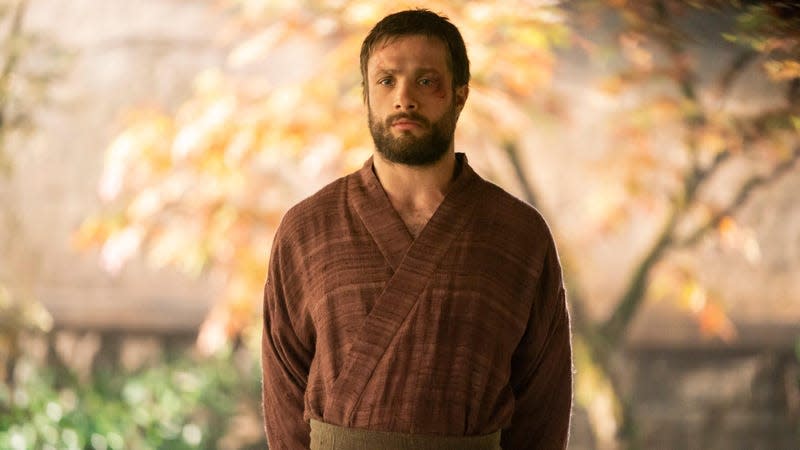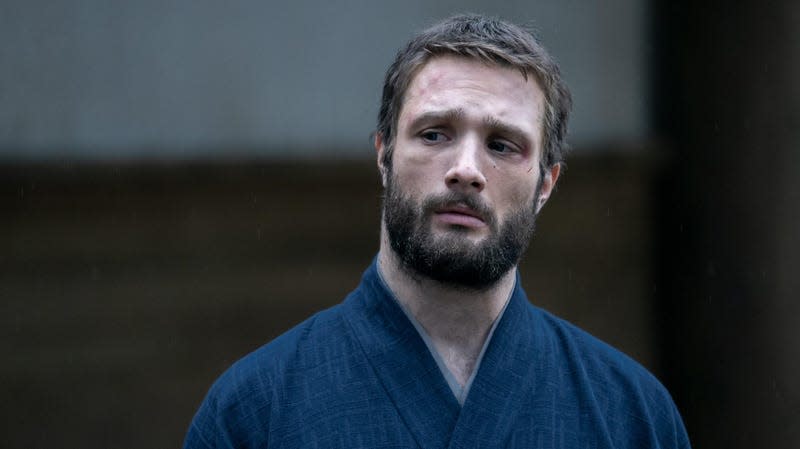The white guy in Shōgun can't help but fail upward

- Oops!Something went wrong.Please try again later.
- Oops!Something went wrong.Please try again later.
In developing its new adaptation of James Clavell’s Shōgun, FX specifically set out to avoid simply rehashing the “whitewashed” 1980 original, which starred Richard Chamberlain and was entirely told from the perspective of his character, John Blackthorne, an English seaman who gets shipwrecked in Japan in the 1600s and must learn their ways in order to survive (while also passing on his knowledge of English romance and warfare). This new take pulls back the focus to center on a larger group of characters and treats the saga as more of a historical epic than one white man’s adventure, which allows it to showcase more of the Japanese perspective and gives it a more mature and culturally coherent story. It also, intentionally or not, turns its new version of John Blackthorne into the most perfect putz, the most lovable dingus, and the most frustratingly endearing dorkus to ever set sail.
New John Blackthorne actor Cosmo Jarvis (who possesses one of mankind’s great names and came up with a voice for the character that sounds like Robert Shaw in Jaws crossed with Solid Snake) doesn’t play the guy as an idiot; it’s that the circumstances of the plot render him an idiot, and Cosmo Jarvis handles it brilliantly. One of the joys of FX’s Shōgun, especially in its early running, is when Blackthorne finds himself present for some kind of political intrigue involving his new steward Lord Toranaga (the eternally great Hiroyuki Sanada) or the suspiciously aspirational Yabushige (Tadanobu Asano) and just stands there and watches with a completely blank expression on his face because he has absolutely no idea what is happening.
It’s a delightful conceit—even if it’s not played for laughs all that often—to have one of the leads of a show living in a new place where he doesn’t understand a single syllable of the language, to say nothing of the various rituals and customs in Japan that Blackthorne has so much trouble wrapping his head around. The political intrigue is also so compelling, thanks to the steady hand of Sanada and the more emotional lens put on everything by Anna Sawai’s Mariko, that it’s easy to forget that the Anjin (or “pilot,” as they call him) is even still hanging around. Whenever the camera cuts to him having no clue about how he’s supposed to react to anything until Mariko—who serves as his translator and that’s definitely all she is—patiently explains things to him, there’s a little moment where it’s clear that his very existence is at least mildly annoying to everybody in the whole country. And it’s very funny.
It would be easy for this to rob the character of any agency, a potential overcorrection from making him the central protagonist of the original miniseries, but Jarvis plays Blackthorne as a guy with immense willpower and enough self-awareness to recognize when something is important even when he doesn’t know why or what or who or how or… anything that a person might know about a situation they find themselves in. Better yet, while he presents himself as someone who is confident in himself, if nothing else, the people around him all still react like he’s a uniquely intelligent Golden Retriever. Yabushige goes far enough to refer to him as a dog, even when he’s starting to showcase glimmers of his usefulness.

One of Blackthorne’s best moments comes in the third episode, “Tomorrow Is Tomorrow,” when Toranaga’s men are trying to sneak their leader out of Osaka. Blackthorne doesn’t even know that there’s a scheme in the works, with Toranaga hiding in a box while disguised as his wife. He just waited around until someone told Mariko to tell him they were leaving and then he dutifully tagged along.
But once he realizes what’s happening and sees that guards are about to uncover the hidden daimyō, he flips an internal switch and decides to weaponize how frustrating he is to everyone else around him with an overblown rant about respecting women. It is, without a doubt, a perfect putz move for a man to make a scene by screaming at the top of his lungs about how great of a feminist ally he is, especially when he immediately explains to Mariko that it’s all bullshit and that English society isn’t any more respectful toward women than Japanese society.
Throughout all of this, everyone is drawn to Blackthorne and compelled by the wacky way he does things. He has a special technique for diving into water? How endearing! He wants to try nattō even though he freely admits that it’s stinky and looks unpleasant? Okayyy, Anjin. At least he can teach English military tactics to Toranaga’s army… oh wait, he’s a sailor (cough pirate cough) and doesn’t know anything about infantry battles? Well, what if we just pointed some big-ass cannons at our enemies? And it works better than anyone could’ve predicted?
Most of that happens in the show’s fourth episode, “The Eightfold Fence,” which features Blackthorne’s two best, most dorkus-y scenes. The first is a sweet moment where he puts his money where his mouth is as some sort of feminist icon and presents his assigned consort Fuji (Moeka Hoshi) with one of his flintlock pistols as a gift. In return, she gives him her father’s swords—with even the generally oblivious Blackthorne recognizing the enormous meaning behind such a present. It’s one of the first moments where someone treats him not as a curiosity or as a tool, but as a person, and the emotion of it hits harder because he feels the weight of it and we’ve seen him make that same blank expression every other time something important has happened.
But Shōgun can’t let him get away that easily: Possibly the best scene in the whole series so far comes at the end of episode four, after Mariko visits Blackthorne in the night and the pair sleep together. He wakes up with a cheer and comments to her about having a good time the night before, and she just smirks and says that she’s glad he enjoyed the courtesan she sent to him. It’s an obvious lie, but John Blackthorne being John Blackthorne, he doesn’t get it and swings all the way back to full-dingus as he struggles to avoid making it seem like he thinks all Japanese women look the same. It is, again, very funny.
And yet, episode five (“Broken To The Fist,” which dropped on March 19) puts Blackthorne’s charms (such as they are) to the ultimate test when Mariko’s abusive husband returns from his apparent death earlier in the show and joins the Anjin for a terribly awkward meal. First, Blackthorne tries making a traditional English stew that everyone refuses to eat because it’s so gross (Fuji instructs someone to dump it into the sea) and later he tries to show the husband (Buntaro to his friends) how the English drink—which is to say, in bigger containers than little sake cups.
Blackthorne seems to be using brute force to make himself seem likable, because getting drunk with somebody usually works in stories like this, but it very much does not work here. Angry over Blackthorne’s insistence that he tell some exciting samurai stories (and Blackthorne’s refusal to tell his own war stories, possibly because he doesn’t have any and is secretly a pirate), Buntaro grabs a bow and fires off two arrows, which fly right across Mariko’s nose and stick into the exact same place on a fencepost outside the house—the implication being “I did that while shitfaced; don’t fuck with me.”
Like receiving the swords, it lands because we’ve seen Toranaga and Mariko and other people in Blackthorne’s orbit react to his behavior with an “Oh, you” smile, but instead of showing him respect here (and great respect at that, even if we later learn that the swords aren’t as special as Fuji thinks they are), it’s complete and utter contempt. It’s the first time since Blackthorne started ingratiating himself to the people of Japan that we see that he’s not invincible and that his Golden Retriever act doesn’t work on everybody.
And with a war between Toranaga and the other daimyōs now on the horizon (plus some devastating earthquakes), it’s starting to look like he won’t be able to depend exclusively on everyone’s half-hearted pity and begrudging respect much longer.

